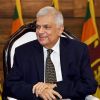Directory
Ranil Wickremesinghe President of Sri Lanka
President of Sri Lanka and Leader of the United National Party Ranil Wickremesinghe has been sworn in as the President of Sri Lanka on 21st July 2022. He has been the Prime Minister of Sri Lanka on six occasions. He was first appointed PM from 1993 – 1994 after the assassination of President Ranasinghe Premadasa. Subsequently, from 2001 to 2004, he was elected as the Prime Minister to lead the United National Front Government during the presidency of Chandrika Kumaratunge. In January 2015, he was appointed as the Prime Minister of the coalition government after the election of President Maithripala Sirisena. His appointment was sanctioned by the Sri Lankan people at the general election of August 2015. Once again, in December 2018, President Sirisena was compelled to reappoint him as PM after illegally dismissing him in October 2018. In November 2019, after the defeat of the UNP presidential candidate, he resigned from his position as Prime Minister. In May 2022, he accepted the invitation made by President Gothabhaya Rajapakse to be appointed the Prime Minister of an interim government to extend his expertise and experience in mitigating the economic and political meltdown in the country. He is the Leader of the United National Party (UNP), Sri Lanka’s oldest political party, founded in 1946. He is one of Sri Lanka’s most senior and experienced legislators who has served the country as an MP in all Parliaments since 1977 (apart from a break of 10 months from August 2020 to June 2021). Political Beginnings Born in 1949 after Sri Lanka gained independence from the British, Ranil Wickremesinghe is truly a leader of the new independent era. A lawyer by profession, he was elected to Parliament in 1977 (aged 28), having worked in the Youth League of the UNP from his university days. As the youngest Minister in Sri Lanka at the time, he held the post of Deputy Minister of Foreign Affairs under President Jayewardene. Very soon, in recognition of his exceptional talents and unique capacity for work, he was appointed to the Cabinet of Ministers as the Minister of Youth Affairs and Employment. Later on, he was given the portfolio of education. Then in 1989, as a seasoned legislator, he was made the Leader of the House under President Premadasa. He also served as the Minister of Industries, Science and Technology. Early Achievements From 1977 to 1994, during the seventeen years that the UNP was consecutively returned to power, Ranil Wickremesinghe, as a dynamic young politician, had a crucial impact on the country’s development. Many consider him the best education minister produced by the country due to the radical reforms he initiated in the 1980s aimed at the qualitative improvement of school education. The reforms involve upgrading subjects such as English and introducing Technology and Computer skills. He also professionalised the educational service via the Sri Lanka Education Adm







